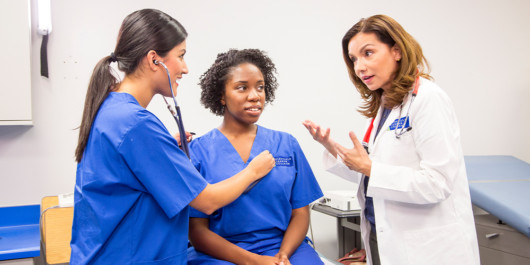Medical assistants are also known as clinical medical assistants, care providers or administrative medical assistants. To become one, you must have an associate degree or certificate of completion from a school that is approved by the American Association.
A licensed medical assistant can work in many different environments, but they are most common in hospitals, outpatient clinics and physician’s offices. There are several things one should learn to become a successful medical assistant, which includes:
- communication skills
- professionalism
- time management
- certification
Medical Assistants usually begin their careers working with patients under the supervision of physicians to assist with daily tasks, including taking medical histories, recording vital signs (height/weight, pulse rate, blood pressure, temperature, respiratory rate, oxygen saturation), preparing treatment rooms and equipment for examinations or procedures, sterilizing medical instruments, administering medications as directed by physicians’ orders or protocols, instructing patients about medication aftercare instructions and explaining tests and treatments.

Here are some essential soft skills that a qualified medical assistant should have:
Communication Skills
If you want to obtain this profession, you must have strong communication skills, both written and oral. These soft skills are essential to effectively communicate with your co-workers and build strong relationships with others. In addition to being able to communicate well, working in a diverse environment is very important. Being able to work alongside people of different backgrounds will help build a more successful office.
A patient’s comfort level is increased when they feel heard, which includes listening and understanding what the patient is saying.
Professionalism
Professionalism in medical offices is critical. This includes making sure to dress in attire that portrays you as a professional.Showing up late or leaving early is a quick way of bad reputation. Even though time may seem like a simple task, many employees still do not get it right.
Time Management Skills
Another soft skill for a successful medical assistant is time management skills. Being organized and knowing how to prioritize will help keep the office running smoothly and efficiently while helping make your workday easier. One can learn these skills by taking organizational classes, which can be done online or through your local community college or university.
Certification needs to be maintained because medical assistants deal with personal information which must be kept private. There are several types of accreditation, all of which can be found on the American Association of Medical Assistants (AAMA) website. The AAMA offers:
- National certification for entry-level medical assisting and recertification every 5 years.
- An individual may also take the national exam given by either AMT or CMA, which certify individuals as certified medical technicians.

When searching for jobs, you should never apply to just local places even though it would be easier. A deep search will increase your chances of getting hired since fewer people are applying for the same position.
The Salary
The salary will vary depending on where you work and your experience working as a medical assistant. A medical assistant usually starts out making around $10 per hour and the average pay is usually closer to about $75,000 annually.
Higher education and certification can increase your salary up to roughly $15 an hour, which is the average amount paid in larger hospitals. To determine how much a medical assistant makes, one should consider the healthcare facility they are employed in. For example, working at a clinic or a small independent office would be less than working in a large hospital or a university centre.



